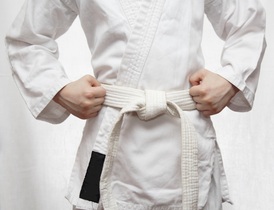
― Orson Scott Card, Ender's Game
Josh Waitzkin commented that one of the most impactful features of the M5 Jiu-Jitsu program was that the CEO was wearing a white belt, symbolizing that I was learning with everyone else.
My modeling of thirst for knowledge helped foster this value in the company. And as I’ve often said, a staff of people who love learning is like a CEO’s wish for more wishes. The tightest bottleneck for us was not capital, or market demand, or technical limitations - it was me, the team, and our own capacity to get stuff done. So I’d better be working on that. Besides, improving my own skills on company time was genuinely fun, a borderline guilty pleasure. C’mon, the training montage is the best part of every action movie - epitomized by one of the best sci-fi books of all time, now a movie, Ender’s Game. (Get it, the game is the end?)
I thought I’d use four concrete skills as examples. Working on these paid big dividends for me. This is not ...
- Sales. It is outrageous that this wasn’t even a course at Wharton. There’s more myth and misinformation about this most crucial of all business skills then there was about sex pre Masters and Johnson (enjoying this Showtime show now). When we started M5 sales was my responsibility, so I read a lot about it. That’s about as useful as reading about ways to get in shape. Eventually, I choose Sandler-style sales kung-fu, and hired a coach. My small sales team and I then started to use the same language to evaluate each other. We debriefed each other after calls, and for an hour together each week we role-played. We took turns presenting training for each other. Years later, without all that, I know I’ve gotten rusty, and I see myself pitching various ideas instead of reversing and asking questions. While this became a strength for me, I know I could get better still.
- Public Speaking. I define this as talking to any group - a few people or more - not just the big venues. I remember after giving what I thought was a perfectly good presentation, my friend and colleague Cahal Grennan poked me in the chest and said, “If we’re going to be a big company, you’ve got to be way better at this.” This is a great example of passive vs. active knowledge if there ever was one. You might understand oratorical principles, and we've all probably read about them. But try pausing for four seconds, live, like a world-class presenter does. Try to speak in threes so even impromptu remarks sound polished. Start to deploy time-worn rhetorical devices, start to learn to build to clap-traps, start to be a modulate your tone! I’ve hired a couple great coaches along the way, and included my team. Expensive, but worth it. Cahal started a toastmasters chapter in the office, which was really popular. I learned to love this sport. It was great to be able to pull my colleagues in for a real critique before a presentation and vice versa. Now my favorite question after a good presentation is, “Who’s your coach?” Many really good speakers have an answer. Everyone wants to present like Jobs - well, guess what, he worked each keynote for days before making it look easy and he hired pros to help.
- Negotiation. In contrast to sales, this one has made its way into most MBA curriculums, and is consistently top-rated by students. Thanks to Roger Fisher (Getting to Yes), the dogma has shifted from haggling to joint problem-solving. Few skills that have a more direct impact on value creation. Imagine if you and your team could negotiate just 3% more effectively. We ran the MBA curriculum at M5 and even had a professor teach it. Approaches like “widening the pie” became standard for us. I found that reading through a book on negotiation when I faced a big one and doing a little prep and planning was invaluable. When it came time for my biggest negotiation, I hired one of Roger Fischer’s proteges as our banker. Great on-the-job training if there ever was, and it showed just how much better one could get at this. What do you value more in your banker: connections, analytical prowess, or negotiations mastery?
- Teamwork. Most people don’t know how to begin improving this quintessential leadership skill. You can’t see what you are doing well or not, you just feel if it is kind of working well or that something’s wrong. Even if you’ve read a few Pat Lencioni books and have some theory about it, you probably still forget most of it while going through the day. How do you make it muscle memory? OK, you can head to a ropes course. But the absolute best training we ever had was Pluralistic Networks, “Working Effectively in Small Teams.” Four months long and enough to rewire a neural pathways and bad habits. The course is centered on immersive experiences in the World of Warcraft game, where you can observe your team patterns from a new angle. So fun! We got teased, but also got the last laugh!
Which skills are you working on? Are you open to getting the maximum help you can by walking around in the posture of a beginner? Do you have a coach? Do you practice with live ammo or in a safe space before the performance? I can list a hundred others skills to practice from reading a balance sheet to telling if someone is lying. I'm always curious to hear about great experiences and great teachers. Let me know what you've got!
 RSS Feed
RSS Feed